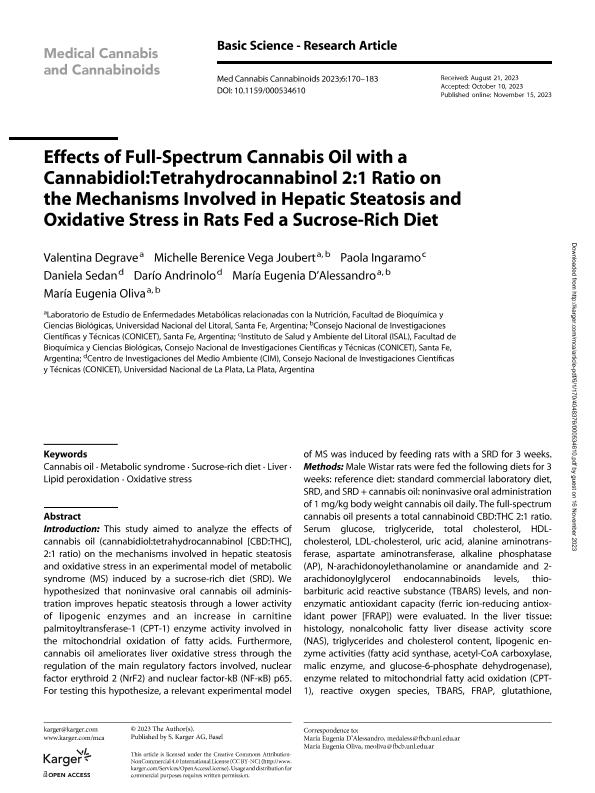Artículo
Effects of Full-Spectrum Cannabis Oil with a Cannabidiol:Tetrahydrocannabinol 2:1 Ratio on the Mechanisms Involved in Hepatic Steatosis and Oxidative Stress in Rats Fed a Sucrose-Rich Diet
Degrave, Valentina María; Vega Joubert, Michelle Berenice ; Ingaramo, Paola Inés
; Ingaramo, Paola Inés ; Sedan, Daniela Yazmine
; Sedan, Daniela Yazmine ; Andrinolo, Dario
; Andrinolo, Dario ; D'alessandro, Maria Eugenia Guadalupe
; D'alessandro, Maria Eugenia Guadalupe ; Oliva, Maria Eugenia
; Oliva, Maria Eugenia
 ; Ingaramo, Paola Inés
; Ingaramo, Paola Inés ; Sedan, Daniela Yazmine
; Sedan, Daniela Yazmine ; Andrinolo, Dario
; Andrinolo, Dario ; D'alessandro, Maria Eugenia Guadalupe
; D'alessandro, Maria Eugenia Guadalupe ; Oliva, Maria Eugenia
; Oliva, Maria Eugenia
Fecha de publicación:
11/2023
Editorial:
Karger
Revista:
Medical Cannabis and Cannabinoids
e-ISSN:
2504-3889
Idioma:
Inglés
Tipo de recurso:
Artículo publicado
Clasificación temática:
Resumen
Introduction: This study aimed to analyze the effects of cannabis oil (cannabidiol:tetrahydrocannabinol [CBD:THC], 2:1 ratio) on the mechanisms involved in hepatic steatosis and oxidative stress in an experimental model of metabolic syndrome (MS) induced by a sucrose-rich diet (SRD). We hypothesized that noninvasive oral cannabis oil administration improves hepatic steatosis through a lower activity of lipogenic enzymes and an increase in carnitine palmitoyltransferase-1 (CPT-1) enzyme activity involved in the mitochondrial oxidation of fatty acids. Furthermore, cannabis oil ameliorates liver oxidative stress through the regulation of the main regulatory factors involved, nuclear factor erythroid 2 (NrF2) and nuclear factor-kB (NF-κB) p65. For testing this hypothesize, a relevant experimental model of MS was induced by feeding rats with a SRD for 3 weeks. Methods: Male Wistar rats were fed the following diets for 3 weeks: reference diet: standard commercial laboratory diet, SRD, and SRD + cannabis oil: noninvasive oral administration of 1 mg/kg body weight cannabis oil daily. The full-spectrum cannabis oil presents a total cannabinoid CBD:THC 2:1 ratio. Serum glucose, triglyceride, total cholesterol, HDL-cholesterol, LDL-cholesterol, uric acid, alanine aminotransferase, aspartate aminotransferase, alkaline phosphatase (AP), N-arachidonoylethanolamine or anandamide and 2-arachidonoylglycerol endocannabinoids levels, thiobarbituric acid reactive substance (TBARS) levels, and non-enzymatic antioxidant capacity (ferric ion-reducing antioxidant power [FRAP]) were evaluated. In the liver tissue: histology, nonalcoholic fatty liver disease activity score (NAS), triglycerides and cholesterol content, lipogenic enzyme activities (fatty acid synthase, acetyl-CoA carboxylase, malic enzyme, and glucose-6-phosphate dehydrogenase), enzyme related to mitochondrial fatty acid oxidation (CPT-1), reactive oxygen species, TBARS, FRAP, glutathione, catalase, glutathione peroxidase, and glutathione reductase enzyme activities. 4-hydroxynonenal, NrF2, and NF-κB p65 levels were analyzed by immunohistochemistry. Results: The results showed that SRD-fed rats developed dyslipidemia, liver damage, hepatic steatosis (increase of key enzymes related to the novo fatty acid synthesis and decrease of key enzyme related to mitochondrial fatty acid oxidation), lipid peroxidation, and oxidative stress. Hepatic NrF2 expression was significantly decreased and NF-κB p65 expression was increased. Cannabis oil administration improved dyslipidemia, liver damage, hepatic steatosis, lipid peroxidation (improving enzymes involved in lipid metabolism), and oxidative stress. In the liver tissue, NrF2 expression increased, and NF-κB p65 expression was reduced. Conclusion: The present study revealed new aspects of liver damage and steatosis, lipid peroxidation, and oxidative stress in dyslipidemic insulin-resistant SRD-fed rats. We demonstrated new properties and molecular mechanisms of cannabis oil (CBD:THC, 2:1 ratio) on lipotoxicity and hepatic oxidative stress in an experimental model of MS.
Archivos asociados
Licencia
Identificadores
Colecciones
Articulos (CIM)
Articulos de CENTRO DE INVESTIGACIONES DEL MEDIO AMBIENTE
Articulos de CENTRO DE INVESTIGACIONES DEL MEDIO AMBIENTE
Articulos(CCT - SANTA FE)
Articulos de CTRO.CIENTIFICO TECNOL.CONICET - SANTA FE
Articulos de CTRO.CIENTIFICO TECNOL.CONICET - SANTA FE
Articulos(ISAL)
Articulos de INSTITUTO DE SALUD Y AMBIENTE DEL LITORAL
Articulos de INSTITUTO DE SALUD Y AMBIENTE DEL LITORAL
Citación
Degrave, Valentina María; Vega Joubert, Michelle Berenice; Ingaramo, Paola Inés; Sedan, Daniela Yazmine; Andrinolo, Dario; et al.; Effects of Full-Spectrum Cannabis Oil with a Cannabidiol:Tetrahydrocannabinol 2:1 Ratio on the Mechanisms Involved in Hepatic Steatosis and Oxidative Stress in Rats Fed a Sucrose-Rich Diet; Karger; Medical Cannabis and Cannabinoids; 6; 1; 11-2023; 170-183
Compartir
Altmétricas



